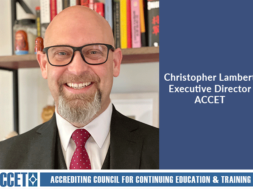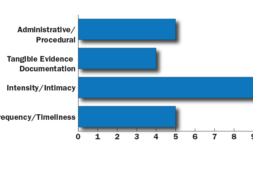
List of National Accreditor Eligibility Requirements
CER created this list of national accreditor eligibility requirements as a resource for our subscribers. We thought it would be helpful to have this information together in one place.
Please note: The Accrediting Council for Independent Colleges and Schools (ACICS) is not included because, according to a June press release, ACICS has taken a hiatus on accepting new applications for initial grants of accreditation.
Disclaimer: All information was gathered from the accrediting agencies website and is current as of Nov. 1, 2016. The content of this article is for informational purposes only and does not constitute as advice. No one should act or refrain from acting on the basis of this article. Contact the accrediting agency for more information.
Accrediting Bureau of Health Education Schools (ABHES)
7777 Leesburg Pike, Suite 314
N. Falls Church, VA 22043
P: 703-917-9503
F: 703-917-4109
www.abhes.org
Institutional eligibility requirements
1. It is (a) an institution in the private sector whose principal activity is education, (b) a hospital or laboratory-based training school, (c) a vocational training institution, or (d) a federally-sponsored training program.
2. It is an educational institution that offers programs predominantly in the health education field. An institution meets this requirement if (a) 70 percent or greater of its full-time equivalent students are enrolled in health programs, or (b) 70 percent of its active programs are in the health education field, provided that a majority of an institution’s full-time equivalent students are enrolled in those programs. A program is active if it has a current student enrollment and is seeking to enroll students.
3. All of its programs are career focused and designed to lead to employment.
4. It is located in the United States or its territories.
5. It is properly licensed, chartered or approved to provide education beyond the secondary level under the laws and regulations of the state(s) or territories in which it operates.
6. It must have been legally operating and continuously providing instruction as an institution for at least the prior two years.
7. It has enrollment in the program(s) to be included in the grant of accreditation to allow evaluation of student outcomes. (Does not apply to current-institutionally-accredited members).
8. It has at least one graduating class from at least one program(s) currently offered to determine the overall educational effectiveness of the program(s) of study offered.
Accrediting Council for Continuing Education (ACCET)
1722 N Street NW
Washington, DC 20036
P: 202-955-1113
F: 202-955-1118
www.accet.org
Institutional eligibility requirements
1. It has an identified body of individuals actively involved in a prescribed learning format and setting. Programs offered must provide a clearly interactive component of educational methodology appropriate to the subject matter and expected training outcomes.
2. It meets applicable state licensing requirements.
3. It has a predominant portion of the participants involved in a continuing education experience convergent with those outlined in Document 24 – Profile of Institutional Clientele and Programs.
4. It can demonstrate continuous, on-going and successful operation of the institution in the delivery of education and/or training programs for at least two consecutive years immediately prior to application. At minimum, one graduating class must have completed their training.
• The term “continuous operation” means that the principal educational and training activities of an institution, for which accreditation or reaccreditation is sought, has proceeded as scheduled without interruption.
• Exceptions may be recognized after the fact when the interruption is caused by forces of nature, civil disorder, or abrupt and unforeseeable change in law or regulation affecting the institution.
• An institution may apply for an exception before the fact upon application to the Commission and a showing of good cause for the exception. Applications must be submitted in a timely manner, considering the circumstances, in order to permit proper consideration of the application.
5. It has not had a prior accreditation withdrawn from a nationally recognized accrediting agency, nor has it voluntarily withdrawn under a show cause action, within one year prior to application to ACCET.
6. It has been under the same ownership and/or control for at least two (2) years immediately prior to application. This requirement may be waived by the Commission upon provision of acceptable documentation showing the applicant institution is owned or controlled by an educational organization with a reputable history of stable operations and by individual(s) with extensive credentials that demonstrate competent administration of an accredited institution.
7. It is an educational establishment that offers postsecondary certificates, diplomas, or degrees up to the Associate’s level. If the institution offers more advanced degrees, specifically at the Bachelor’s degree level and above, that entity will not be eligible for accreditation. This restriction does not apply to a stand-alone department within a higher education institution that offers Intensive English Programs (IEPs).
8. It prescribes a correspondent time function of education and training offered in continuing education units, clock hours, or credit hours.
9. It offers education and training other than that required for academic credentials.
10. It agrees upon application and accreditation to abide by the ACCET Bylaws, Principles of Ethics, and ACCET Standards for Accreditation, policies and procedures and to support the goals and integrity of the accreditation process.
11. It has demonstrated a record of responsible financial management (minimum 2 years) with resources sufficient to maintain quality training and educational services and to complete the instruction of all enrolled participants.
Accrediting Commission of Career Schools and Colleges (ACCSC)
2101 Wilson Blvd., Suite 302
Arlington, VA 22201
P: 703-247-4212
F: 703-247-4533
www.accsc.org
Institutional eligibility requirements
1. The school and its programs must fall within the Commission’s scope as stated in these Rules.
2. The school must have all necessary authorizations from the state(s) in which it operates and be in compliance with all applicable local, state, and federal requirements. Schools under investigation or sanction by a local, state, or federal agency may be deemed ineligible to apply for initial accreditation with ACCSC.
3. At the time of application, the school must have been appropriately licensed by the state(s) in which it operates and training students continuously for the preceding two consecutive years (except for regularly scheduled breaks and vacation periods) and must commit to operating continuously thereafter.
4. At the time of initial application, the school must have graduated at least one class of students from the longest program(s) offered during the two-year period preceding its application for accreditation. Prior to a grant of initial accreditation, the school must be able to provide student achievement outcomes for its programs prepared in accordance with the Commission’s student achievement reporting requirements.
5. At the time of initial application, the school must be financially sound with sufficient resources for its proper operation and discharge of its obligations to students. The school must demonstrate two years of operating history through the submission of financial statements that are prepared in accordance with the Instructions for the Preparation and Submission of Financial Statements and Related Information and that show that the school has met the financial tests for initial applicants included in those instructions.
6. The school must, at a minimum, offer at least one program that is 300 clock hours or longer in length.
7. Within the six months prior to submitting an application for accreditation, the school’s full-time on-site director or appropriate management team representative (see Section I (A)(1)(a), Substantive Standards, Standards of Accreditation) must attend an ACCSC Accreditation Workshop.
8. The school’s application for accreditation (initial or renewal) must be complete.
Council on Occupational Education (COE)
7840 Roswell Road
Building 300, Suite 325
Atlanta, GA 30350
P: 770-396-3898
F: 770-396-3790
www.council.org
Institutional eligibility requirements
For Candidacy for Accreditation (pre-accreditation status):
1. Offer applied associate degree and/or non-degree postsecondary instruction exclusively in career and technical education at all campuses.
2. Have produced a graduate from the longest program offered by the institution.
3. Utilize a campus-based instructional delivery system with at least 25 percent of the institution’s total FTE being derived from enrollments in traditional programs.
4. Have an institutional enrollment of no fewer than 10 FTE.
5. Be legally authorized to operate within the jurisdiction in which it is located for a minimum of one year.
6. Have been in possession of current and applicable licensure/authorization for a minimum of one year.
7. Have been in continuous operation and providing instruction at the main campus and under the same ownership for a minimum of one year.
8. Have the on-site administrator or other full-time employee at the main campus attend a Candidate Academy within 6 months prior to submitting an application for candidate status.
9. Demonstrate that it has the administrative capabilities (including, but not limited to, financial) to support the educational programs offered.
10. Demonstrate that it meets the financial stability requirements for the most recent completed fiscal year as stated in Standard 7 – Financial Resources.
11. Be in compliance with all Federal requirements applicable to accreditation.
12. Agree to comply with all requirements of the Council.
Distance Education Accrediting Commission (DEAC)
1101 17th Street NW, Suite 808
Washington, DC 20036
P: 202-234-5100
F: 202-332-1386
www.deac.org
Institutional eligibility requirements
1. A distance education institution or provider is defined by DEAC as an educational institution or organization whose primary purpose is providing education or training which:
• Formally enrolls students and maintains student records;
• Retains qualified faculty to service students;
• Provides educationally sound and up-to-date curricula that are supported by quality instructional materials and appropriate technology; and
• Provides continuous two-way communication on student work, e.g., evaluating students’ examinations, projects, and/or answering queries, with timely feedback given to students.
• Furthermore, each program offered by the institution is predominantly distance education or correspondence education (51 percent or more); and
• The institution offers non-degree and/or degree programs up to the professional doctoral level pursuant to DEAC’s scope of recognition.
2. The institution is properly licensed, authorized, exempted, or approved by all applicable state education institutional authorities (or their equivalent for non-U.S. institutions). The institution is in compliance with all applicable local, state, and federal requirements. Exemptions from state law are supported by state-issued documentation or in statutory language for that state. Should an accredited institution lose its state licensure in its state of domicile for whatever reason, DEAC accreditation terminates as of the date of the loss of state licensure, subject to DEAC’s appeal procedures.
3. At the time of the initial application, the institution has been enrolling students in the current programs for two consecutive years and under the present ownership (no new programs may be added during the two-year period).
4. The institution has clearly articulated outcomes for its educational offerings and has an ongoing outcomes assessment program in place designed to measure student achievement and satisfaction.
5. The institution’s permanent physical business office is at a fixed geographic location that is appropriately licensed or authorized as required by local and state regulatory authorities. A P.O. Box is not a physical business office address.
6. The institution documents, through audited or reviewed comparative financial statements that cover its two most recent fiscal years, that it is financially sound and can meet its financial obligations to provide instruction and service to its students. All financial statements submitted to DEAC are prepared in compliance with generally accepted accounting principles (GAAP). In the event the financial operations of the institution are supported by a parent company or a third party, audited or reviewed financial statements are provided by the supporting entity to demonstrate that the supporting entity possesses sufficient financial resources to provide the institution continued financial sustainability, as well as the commitment to do so.
7. The institution demonstrates that its name is free from any association with any activity that could damage the standing of DEAC or of the accrediting process, such as illegal actions, unethical conduct, or abuse of consumers.
8. The institution, the institution’s owners, governing board members, officials, and administrators possess sound reputations and show a record of integrity and ethical conduct in their professional activities, business operations, and relations. The owners, governing board members, officials, and administrators have records free from any association with any misfeasance, including, but not limited to, owning, managing or controlling any educational institutions that have entered bankruptcy or have closed, to the detriment of the students.
9. The institution agrees that, as part of the application process, its owners, officers and managers may be subject to a background check by DEAC, which may include, but not be limited to, DEAC surveys of state educational oversight agencies, federal departments and agencies, and consumer protection agencies; and checks on the credit history, prior bankruptcy, criminal background, debarment from federal student aid programs, the closing of educational institutions in which they were owners, managers or principals, or the loss of accreditation or state approval to operate an educational institution. The costs of such background checks will be borne by the Applicant.
10. The institution is free from any pending or final action brought by a state agency or recognized accrediting agency to suspend, revoke, withdraw, or terminate the institution’s legal authority to operate or to deny accreditation or renewal of accreditation.
National Accrediting Commission of Career Arts and Sciences (NACCAS)
3015 Colvin Street
Alexandria, VA 22314
P: 703-600-7600
F: 703-379-2200
www.naccas.org
Institutional eligibility requirements
1. Disqualified Owner. An institution shall not be granted accredited status if a Controlling Voting Interest in the institution is owned or controlled, directly or indirectly, by Disqualified Owners.
2. Except as provided in Section 4.6(g) (see page 81) and 4.6(i) (see page 81) of these Rules, an institution may not be granted accredited status as a Main Campus before it has been in operation as an independent institution (i.e., not as an additional location of another institution) for two years.
3. A private cosmetology school (or department of cosmetology or cosmetology program of study) or specialized school of cosmetology arts and sciences, massage, or related program, located within the United States and/or internationally is eligible to apply for accreditation, provided:
(1) It is a postsecondary institution;
(2) It is licensed by the state in which it is located;
(3) It is in operation and has been in operation at least eighteen (18) months;
(4) It offers at least one program that is more than 150 hours in length or the equivalent measured in credits or competencies;
(5) It has complied with the NACCAS Accreditation Workshop attendance policy (See Appendix #3, page 141);
(6) It has access to the Internet;
(7) It is not owned wholly or in any part by, nor does it employ, any individual who has been debarred from participation in any federal or state program within the past five years;
(8) It has complied with the candidate status requirement; and
(9) In the case of a specialized school of cosmetology arts and sciences, the school must also meet the following criteria:
(i) Be open at least 25 hours per week;
(ii) Operate and offer instruction for a minimum of 40 weeks per year; and
(iii) Meet all applicable State requirements.
4. Exceptions to the “two years in operation” and general eligibility requirements:
(1) An applicant for candidate status does not need to meet the “two years in operation” requirement.
(2) An institution need not comply with the candidate status requirement if it is owned:
(i) By a person(s) or entity that owns at least 10 % of an institution currently accredited by NACCAS; or
(ii) By a person(s) or entity that has owned at least 10 % of an institution accredited by and in good standing with a recognized accrediting agency within the past 24 months.
(3) An institution whose accreditation has been withdrawn by NACCAS (all appeal rights exhausted) or that voluntarily relinquishes accreditation while in withdrawal status may apply for candidate status immediately, but must wait one (1) year before reapplying for accreditation and, subject to the requirements of Section 2.2(a)(iii) (see page 64) of these Rules, shall be treated as a new school for all other purposes.
(4) A school under the same Ownership as one or more accredited schools may apply for accreditation after one full year of operation. The Ownership of the new school must be identical to that of the accredited school.
(5) An applicant for provisional additional location accreditation.
Programs Approved Within the Aegis of Institutional Accreditation
1. Any program exceeding 150 hours in length or the equivalent in credits or competencies and/or leading to initial state licensure or certification must be approved by the Commission. Approval may occur:
• In conjunction with an institutional accreditation review; or
• Between institutional accreditation reviews (see Part 4 (page 77) of the Rules).
2. Courses required for continuing education for licensure renewal or those hours required by the state regulatory agency after an examinee fails the exam do not require approval by NACCAS.
3. Electrology programs must be at least 300 hours in length or the equivalent in credit hours or competencies, unless fewer hours are mandated by state law or regulation.
4. At institutions in states where NACCAS accreditation is recognized for schools to obtain licensure by means of accreditation, all programs offered at the institution seeking or continuing NACCAS accreditation must be approved by the Commission.
5. Any course for continuing education or professional development, of 150 hours or less, taught or sponsored by the institution which the institution wishes to be listed by NACCAS as an approved course.










